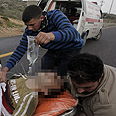
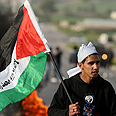

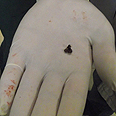
Between protest and intifada: A hunger strike by four Palestinian administrative detainees is at the heart of violent clashes between Palestinians and Israeli security forces.
While forces on the ground are convinced this is not the mark of a third intifada, the chain of events may suggest otherwise. Saturday saw a Palestinian teen injured in clashes, a live bullet found in the body of another Palestinian, and the death in the Megiddo Prison of a Palestinian security prisoner. Meanwhile, countless protests took place across the West Bank.
Related stories
- West Bank: Palestinians hurt by live fire
- Palestinians, IDF forces clash in Jerusalem, West Bank
- Settlers, officers clash near Esh Kodesh outpost
Clashes between Palestinians and security forces in the backdrop of the hunger strike began last week and continued over the weekend.
On Friday, Palestinians protested in various West Bank towns following prayers. In Hebron, dozens rioted while hurling stones and Molotov cocktails at IDF and Border Guard forces.
Local security forces managed to partially contain the annual protest against the closing of the Shuhada street since the Cave of the Patriarchs Massacre.
At the Bituniyeh checkpoint, dozens burned tires and hurled stones at security forces. Clashes were also recorded in Nablus and Tulkarem.
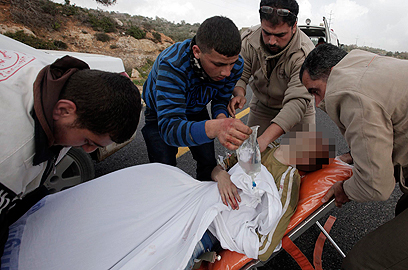
Kusra clashes (Photo: EPA)
In Jerusalem, Palestinians began to hurl stones near the Mughrabi Gate after Friday prayers. Security forces broke into the premises to restore order. Some Palestinians were lightly injured, mostly due to smoke inhalation.
Among the hunger strikers are two Palestinian prisoners who were released as part of the Shalit prisoner exchange deal. Samer Issawi of the Democratic Front for the Liberation of Palestine was sentenced to 26 years in prison in 2002. Defense officials say he resumed his terrorist activity and violated his parole by entering the West Bank. Issawi's friends said he went to visit family in al-Ram.
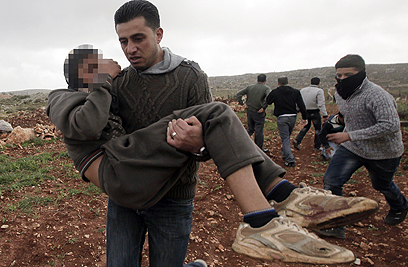
To the Nablus hospital (Photo: AFP)
Ayman Shraune is a Hamas operative from Hebron who was arrested in 2002 for his involvement in a Beersheba terror attack, an attempted kidnapping and various shooting attacks. He was sentenced to 38 years imprisonment. Defense officials say that he resumed his terrorist activity and was therefore arrested again.
The two other hunger strikers are Jafar Izz al-Din and Tarek Hussein, both Islamic Jihad operatives from the northern Gaza Strip.
Sources at the Palestinian Authority expressed satisfaction at seeing the prisoners' issue gaining attention, both locally and in the international arena.
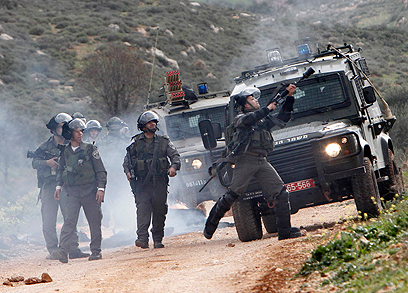
Secuirty forces respond (Photo: Reuters)
"Various international elements are trying to solve the matter including Egypt and the United Nations," said Ziad Abu Ayin, deputy minister in charge of prisoner affairs.
"But Israeli government officials are impeding the efforts. In the past, deals were made to solve similar situations as in Khader Adnan's case but this time we do not feel that Israel wants to end the crisis yet."
Abu Ayin estimated the protests will continue this week but does not believe they are a mark of a new intifada. "We are not there yet but the situation is very volatile. There is escalation in all towns and villages. The death of one of the detainees could spell disaster."
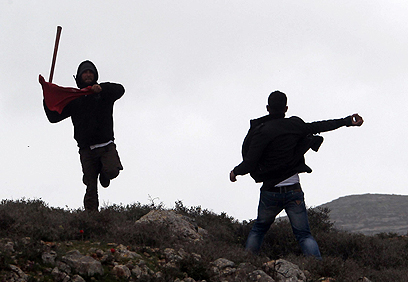
A violent day in the Kusra area (Photo: AFP)
Palestinian lawmaker and one of the protest organizers Mustafa Barghouti said that this month's protests are "reminiscent of those of the first intifada." He estimated that "if something happens to Issawi, the entire West Bank will rise and a new popular, non-violent protest will break."
Meanwhile, the death of Palestinian prisoner Arafat Jaradat in the Megiddo Prison could further fuel the Palestinian protest.
The Israel Prison Service announced that 3,000 security prisoners will launch a one-day hunger strike on Sunday to protest Jaradat's death. Prisoners at the Ofer Prison rioted on Saturday evening, banging on their cell doors and hurling objects at the hallways in proetst.
Attorney Kamil Sabag said that Jaradat's autopsy will be conducted on Sunday with the participation of a Palestinian coroner.
The IDF however pointed to a relative drop in terrorist activity but March is set to determine the general atmosphere in the West Bank. March will see Palestinians marking Prisoners Day, Nakba and Naksa days and US President Barack Obama's visit.
If the visit fails, defense officials estimate the Palestinian leaders may allow violent outbursts by armed groups to happen.
- Receive Ynetnews updates
directly to your desktop















